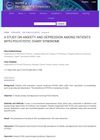Search
for
Sort by
Research
120-150 / 1000+ results
research Introductory Chapter: Alopecia Management – An Update
Some types of hair loss can be reversed, others are permanent, and treatments vary by type.

research Update on Melasma—Part I: Pathogenesis
Melasma's causes include genetics, sun exposure, hormones, and oxidative stress, and understanding these can help create better treatments.

research Adverse Events in Isotretinoin Therapy: A Single-Arm Meta-Analysis
Isotretinoin therapy for acne can cause many reversible side effects, mainly mild skin conditions, and patient understanding of these effects can improve treatment adherence.

research The Mediation Role of Sleep on the Relationship Between Drink Behavior and Female Androgenetic Alopecia
Drinking sweetened tea and soda and poor sleep may increase the risk of hair loss in women.
research Transcranial Photobiomodulation for Brain Diseases: Review of Animal and Human Studies Including Mechanisms and Emerging Trends
Light therapy on the brain shows promise for treating brain diseases and improving brain function.

research Exploring the Relationship Between Acne and Mental Health
Acne is genetically linked to a higher risk of depression, anxiety, schizophrenia, and bipolar disorder, with the strongest link to bipolar disorder.

research Characteristics of Men Who Report Persistent Sexual Symptoms After Finasteride Use for Hair Loss
Finasteride for hair loss may cause persistent sexual symptoms, depression, anxiety, and lower quality of life.

research Alopecia Areata and Health-Related Quality of Life: A Systematic Review and Meta-Analysis
Alopecia areata significantly lowers the quality of life, especially in emotional and mental health aspects.

research The Magnitude of Skin Disease in the United States
Skin diseases, especially psoriasis, greatly affect people's quality of life, similar to chronic diseases.
research Depression in Polycystic Ovary Syndrome: A Systematic Review and Meta-Analysis
Women with PCOS are much more likely to experience depression.

research Effect of COVID-19 on Hair Diseases Observed by Health Care Providers: Analysis of 513 Participants
COVID-19 diagnosis is linked to new or worsening hair diseases, with stress from the pandemic likely contributing.

research DHEA: Why, When, and How Much? Based on the Conference by Bruno Allolio (Wuerzburg), 50th International Clinical Endocrinology Days Henri-Pierre Klotz, September 2007
DHEA supplementation may improve quality of life, neuropsychological functions, and sexual satisfaction in individuals with adrenal insufficiency, but more research is needed to confirm its safety and effectiveness.
research Quality of Life Assessment in Patients with Androgenetic Alopecia
Androgenetic alopecia significantly harms quality of life, affecting emotions and relationships.

research Psychological Aspects of Hyperandrogenic States in Late Adolescent and Young Women
Young women with high male hormone levels or PCOS often feel more psychological distress and have a lower quality of life.
research A Comparison of Quality of Life and Nutritional Status After Gastrectomy in Korean Gastric Cancer Patients
Improving nutrition after gastrectomy can enhance quality of life and aid recovery.

research Sexuality and Polycystic Ovary Syndrome
Women with PCOS are more likely to experience sexual dysfunction, but lifestyle changes and weight loss can improve sexual function.

research Anxiety, Depression, and Quality of Life in Women with Polycystic Ovarian Syndrome
Women with PCOS often experience anxiety, depression, and a lower quality of life.

research Target-Adverse Events and Fear of Cancer Progression, Anxiety, and Depression in Patients with Advanced Non-Small Cell Lung Cancer
Adverse events in lung cancer treatments increase fear, anxiety, and depression, with newer therapies causing fewer side effects.

research Quality of Life, Psychopathologic Symptoms, and Personality Disorders in Subjects with Androgenetic Alopecia
Alopecia linked to higher anxiety and personality disorders.

research The Psychological Effects of Androgenetic Alopecia in Men
Hair loss can cause low self-esteem, anxiety, and depression in men.

research Quality of Life and Psychosocial Impact of Scarring and Non-Scarring Alopecia in Women
Women with scarring alopecia have a lower quality of life and more anxiety and depression than those with non-scarring alopecia.

research Clinical and Epidemiological Characteristics and Associated Factors of Hair Graying: A Population-Based, Cross-Sectional Study in Turkey
Most people in Turkey start getting gray hair around 33 years old, with factors like age, education, hair loss, skin type, family history, and anxiety playing a role.

research Anxiety, Depression, and Quality of Life in Children and Adults With Alopecia Areata: A Systematic Review and Meta-Analysis
People with alopecia areata are more likely to have anxiety and depression and a lower quality of life.

research Anxiety and Depression in Women with Polycystic Ovary Syndrome
Women with Polycystic Ovary Syndrome (PCOS) often have higher levels of anxiety and depression, especially if they live in rural areas, have less education, don't have children, are over 30, or are obese.

research Quality of Life in Young Men with Androgenetic Alopecia: A Mixed Methods Study
Hair loss lowers young men's self-esteem, increasing social anxiety and affecting daily life.

research An Analysis of the Correlation Between Alopecia and Chief Complaints
Hair loss is significantly linked to symptoms like dry hair, scalp issues, addiction to tobacco or coffee, anxiety, and digestive problems.

research Depression and Anxiety in Patients With Polycystic Ovary Syndrome: A Cross-Sectional Study in Saudi Arabia
Many women with PCOS in Saudi Arabia suffer from depression and anxiety.

research Psychological Characteristics of Women with Androgenetic Alopecia: A Controlled Study
Women with AGA often face anxiety, depression, and low self-esteem; psychological support is important.

research A Study on Anxiety and Depression Among Patients With Polycystic Ovary Syndrome
People with polycystic ovary syndrome often experience anxiety and depression.